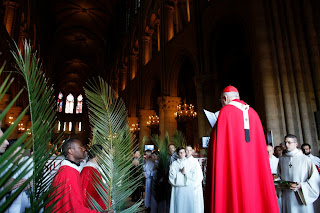Blessed Charles de Foucauld (d. 1916), a soldier and explorer, monk and priest, missionary and martyr, once wrote, “We are all children of the Most High. All of us: the poorest, the most outcast, a newborn child, a decrepit old person, the least intelligent human being, the most abject, an idiot, a fool, a sometimes sinner, the greatest sinner, the most ignorant, the last of the last, the one most physically and morally repugnant—all children of God and sons and daughters of the Most High... We should love all humankind, for they are all children of God.” Our dignity and worth as persons is simply based on the reality that we are all daughters and sons of God. All the good that is within us—our hope, our faith, our love—are gifts from our Creator. The story of the woman caught in adultery ( John 8:1-11 ) reminds us that sin, turning away from God and denying our own dignity and worth, is not an ending. Because God’s love and mercy are unlimited, ...






